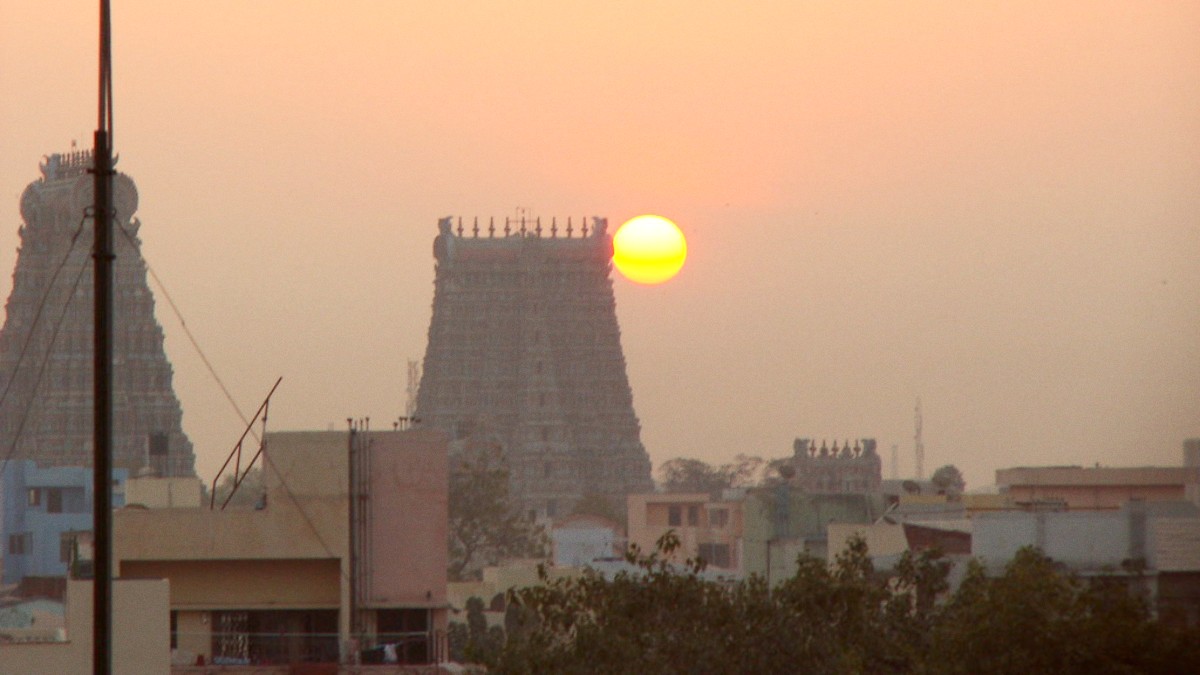
Tamil Nadu, India
Consider Madurai's climate patterns throughout the year when planning your trip. This helps you select comfortable and rewarding travel dates.
Climate patterns throughout the year:
Summer (March - June): This period brings heat and humidity. Temperatures range from 28°C to 40°C (82°F to 104°F). May and early June often see the hottest conditions, with temperatures sometimes over 40°C. Days are long and sunny, but intense heat can make extended outdoor activities challenging.
Monsoon (July - October): Madurai experiences moderate to heavy rainfall. The Northeast Monsoon, from October to December, contributes a significant portion of the annual rainfall. Humidity stays high. Temperatures range from 25°C to 35°C (77°F to 95°F). You can expect frequent showers, sometimes lasting for several hours. This rain can affect outdoor plans and cause localized water logging.
Winter (November - February): This stands as the most comfortable period for visitors. The weather stays relatively pleasant and dry. Temperatures range from 20°C to 30°C (68°F to 86°F). Days are sunny with mild temperatures, and evenings stay cooler. This season presents clear skies and comfortable conditions for sightseeing.
Most foreign nationals require a visa for entry into India. Plan your visa application well in advance of your travel dates.
E-Visa: The most convenient option for tourists from over 160 countries. Apply online for tourism, business, or medical purposes. The process involves uploading a digital photograph and a scanned copy of your passport bio-page. Submit your application at least four days before travel, but earlier submission is a good idea. The e-Visa permits entry at designated international airports and seaports. After approval, you receive an Electronic Travel Authorization (ETA) via email. Print this ETA and carry it.
Regular Visa: If your nationality does not qualify for an e-Visa, or if your plan a longer stay or a purpose other than tourism, business, or medical treatment, a regular visa application is necessary. Apply at the Indian embassy or consulate in your country of residence. This process usually involves submitting physical documents and attending an interview. Processing times vary significantly, so begin this process several weeks or months before your intended travel.
Plan ahead for Indian visa processing.
Convenient online application for tourists.
Mandatory if arriving from specific risk countries.
Gather essential paperwork.
Six months beyond departure, two blank pages.
May be requested by immigration officials.
What to expect upon arrival.
Collected for e-Visa holders at immigration.
No additional permissions generally needed for city tourism.
The weather is ideal for sightseeing, temple visits, and city exploration on foot. Many festivals occur during this time, creating rich cultural experiences. The climate is dry and pleasant, making outdoor activities enjoyable. Expect higher prices for accommodation and flights. Major attractions, especially the Meenakshi Amman Temple, see larger crowds. Book hotels and transport well in advance.
Fewer tourists mean lower prices for hotels and potentially flights. Landscapes become lush and green after initial monsoon rains, creating good photography opportunities. You get a more local experience with fewer crowds. Intermittent rainfall is common, and humidity stays high. Some outdoor activities might see disruption from rain, and street conditions can be wet.
Significantly lower prices for everything, from hotels to local tours.
Tourist crowds are minimal, creating a quiet experience at popular sites.
Weather is extremely hot and humid, making prolonged outdoor exploration uncomfortable.
Heat-related illnesses exist as a risk. Many locals prefer to stay indoors.
Focus on indoor activities during peak heat hours.
The Indian Rupee (INR) serves as the local currency. Insubuy offers medical and travel coverage for those visiting the U.S.
The local currency is the Indian Rupee (INR), symbol ₹. Banknotes include ₹10, ₹20, ₹50, ₹100, ₹200, ₹500, and ₹2000. Coins are ₹1, ₹2, ₹5, and ₹10. Exchange foreign currency at major airports or larger banks in Madurai. ATMs are widely available. Inform your bank before travel to India.
Tipping is not mandatory in Madurai but receives appreciation for good service.
Specific entrance fees for popular sites.
Prioritize your health and safety during your Madurai visit. Travel insurance finds favor for international trips. SafetyWing and World Nomads are popular options. For delayed or canceled flights, AirHelp assists with compensation claims.
Mandatory if arriving from or transiting through a country with Yellow Fever risk.
Consult a travel health clinic or doctor 4-6 weeks before travel for personalized advice.
Hepatitis A & B, Typhoid, Tdap, MMR. Rabies and Japanese Encephalitis for specific itineraries.
Prevention is important for a smooth trip.
Traveler's Diarrhea is a common issue. Drink only sealed bottled water or purified water. Avoid ice unless water source is sure. Eat only hot, freshly cooked food. Avoid raw salads, unpeeled fruits, and street food unless hygiene standards find high visibility.
Mosquito-borne illnesses (Dengue, Chikungunya, Malaria) are present, especially during/after monsoon. Use Insect repellent containing DEET or Picaridin. Wear long sleeves and pants at dawn/dusk. Sleep under a Mosquito net.
Heat Exhaustion/Stroke risks are present in high temperatures. Stay hydrated, avoid midday exertion. Wear lightweight clothing. Recognize symptoms.
Integrates police, fire, and ambulance services.
For direct medical emergencies.
For direct police assistance.
Madurai generally stays safe for tourists. Violent crime against tourists finds rarity. However, petty crime like pickpocketing and bag snatching can occur in crowded areas.
Drink only sealed bottled water from reputable brands. Check the seal before opening. Use filtered or boiled water. Avoid tap water, even for brushing your teeth, if quality is unsure.
Eat only hot, freshly cooked food. Avoid raw salads, unpeeled fruits, and uncooked street food unless the vendor maintains high hygiene.
If a place looks unhygienic or food has been sitting out, avoid it.
Practice good hand hygiene with soap and water or Hand sanitizer.